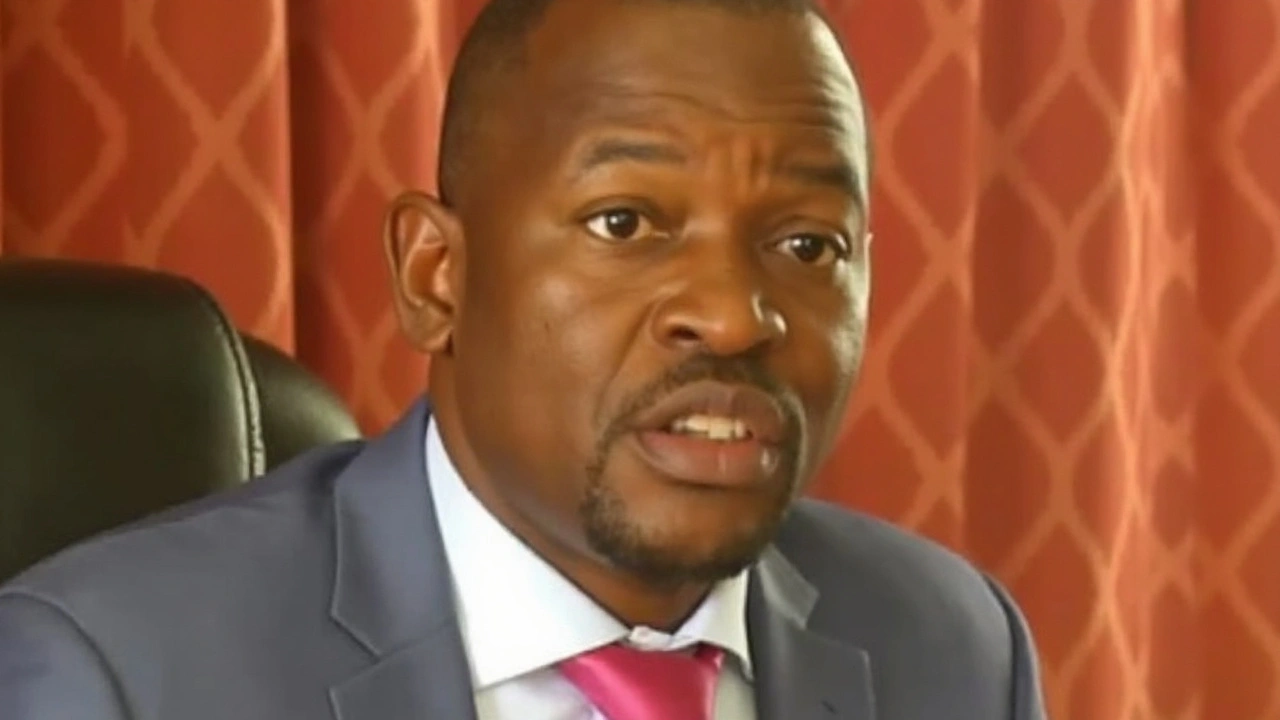The call for accountability within Kenyan politics has taken a bold step with Saboti MP Caleb Amisi demanding the resignations of Prime Cabinet Secretary Musalia Mudavadi and National Intelligence Service (NIS) Director-General Noordin Haji. Amisi, a vocal figure in the political scene, accuses these key advisors of mishandling former Prime Minister Raila Odinga's bid for the African Union Commission (AUC) chairpersonship, a highly coveted position within continental politics.
Raila Odinga's defeat to Djibouti’s Mahmoud Youssouf on February 15, 2025, has sparked considerable debate and introspection about the campaign strategies adopted. According to Amisi, Mudavadi and Haji were instrumental in steering Odinga's campaign but ultimately misled him during the critical stages of the campaign. Their failure to properly navigate regional alliances and provide accurate intelligence assessments are seen as pivotal missteps that contributed to Odinga's loss. This defeat has not only been a personal blow for Odinga but also a diplomatic setback for Kenya.
Amisi criticized the strategic decisions made by Mudavadi and Haji, emphasizing that their assessments were flawed. The campaign began with Odinga securing early leads, yet the lapses in strategy saw him lose this momentum in the later stages of voting. These allegations are part of a broader post-election scrutiny directed towards Kenya’s diplomatic strategies and their effectiveness on the continental stage.
This situation not only highlights the fractures within the political advisory roles but also the ongoing political tensions that exist within the country. Calls for resignations such as Amisi's underscore a wider rift in political alignment and a demand for accountability among leadership circles. It reflects the pressing need for strategic clarity and cohesive planning in international electoral endeavors, lessons that Kenyan political players might need to take into account for future campaigns.
The political drama following the AUC elections is likely to have deeper ramifications. By targeting Mudavadi and Haji, Amisi is urging a reevaluation of accountability and effectiveness in high-stake political bids. Whether these calls will lead to any resignations or reshuffling within the Kenyan political hierarchy remains to be seen, but the demands mark a significant moment in the country’s political discourse.







19 Comments
It's fascinating how Kenyan political calculus often mirrors a chess match where every piece is simultaneously a pawn and a king; Amisi's demand for resignations is less about personal vendettas and more about exposing systemic misalignments that have plagued the AUC bid. The strategic misfires-particularly the underestimation of regional bloc dynamics-reveal a deeper malaise in intelligence coordination. When you factor in the timeline of Odinga's early lead and its abrupt collapse, the pattern resembles a textbook case of information overload coupled with decision paralysis. Moreover, the synergy-or lack thereof-between Mudavadi's political maneuvering and Haji's intelligence assessments creates a feedback loop that ultimately destabilized the campaign. In a scenario where data-driven insights should have guided diplomatic outreach, we instead witnessed speculative conjecture masquerading as expertise. This raises the question of accountability: should advisors be held to the same standard as elected officials when their counsel directly influences electoral outcomes? The Kenyan public, accustomed to political theater, now demands that the curtain be lifted on behind‑the‑scenes machinations. Ultimately, Amisi's call could serve as a catalyst for institutional reform, provided the political elite are willing to confront uncomfortable truths.
Well, if you strip away the polite veneer, what you're really looking at is a circus of egos bruising each other's ambitions with the finesse of a drunken barber wielding a razor. Mudavadi's penchant for grandstanding, paired with Haji's mystifying intel briefings, turned what could've been a precision strike into a slap‑dash improv session. The fact that Odinga's early momentum fizzled out like a flat soda is no accident; it’s the inevitable fallout of strategic myopia spiced with hubris. In the grand tapestry of African politics, this episode will be remembered as the moment the orchestrators forgot their instruments. Let’s hope the fallout forces a recalibration before the next continental showdown.
Ah, the tragic opera of ambition undone by misguided counsel! One can almost hear the mournful strings as Odisha’s campaign sails into a storm of miscalculated alliances. The very architects of his ascent now stand accused of steering him onto the rocks. It is a stark reminder that even the most seasoned statesmen are not immune to the corrosive touch of faulty advice. May this episode serve as a cautionary tale for future aspirants.
The core issue here seems to be a disconnect between intelligence assessments and on‑the‑ground political realities. Effective campaign strategy should integrate both macro‑regional trends and micro‑constituent sentiments. A stronger liaison mechanism between the NIS and political operatives could have mitigated the missteps. Strengthening that bridge would likely improve outcomes in future bids.
Honestly, it reads like a textbook case of political overreach.
When we peel back the layers of this political saga, we encounter not just a failure of execution but a philosophical conundrum about the nature of counsel itself. Is an advisor’s role to anticipate every twist, or merely to illuminate possibilities? The current narrative seems to favor the former, demanding omniscience that no mortal can claim. Perhaps the tragedy lies in expecting a single individual to embody an oracle. In the meantime, the public's clamor for accountability underscores a deeper yearning for transparency. A balanced critique must recognize both human fallibility and institutional responsibility.
Indeed!; the very fabric of political advisory, when stretched beyond its elastic limit, begins to fray-; and fraying threads cannot hold the weight of continental ambition; this is not merely a blunder, it is a symphonic discord that reverberates across the African Union; we must ask whether the architects of this campaign possessed the requisite foresight, or were merely playing a game of chance!; The answer, perhaps, lies in a candid post‑mortem that spares no egos.
Oh great, another brilliant lesson in how not to run a campaign. Apparently, hiring big names doesn't guarantee big wins. Maybe next time they'll read the briefing notes.
While sarcasm paints the picture neatly, the underlying reality is that Kenya's diplomatic machinery needs a serious overhaul. Constructive criticism, not just mockery, will spark the reforms needed. Stakeholders must collaborate, putting aside partisan squabbles, to build a resilient strategy for future continental bids. Only then can we transform criticism into actionable progress.
Teamwork and relentless dedication are the cornerstones of any successful international campaign. Let us channel the lessons learned into a revitalized approach, fostering unity across ministries and advisory bodies. By aligning our objectives and sharpening our strategic foresight, we can restore confidence in Kenya's global aspirations. The journey ahead may be challenging, but with collective resolve, victory remains within reach.
Indeed, the tapestry of continental politics is woven with threads of ambition, strategy, and, inevitably, missteps. When a nation’s leadership stumbles, it offers a reflective surface for the entire continent to examine its own diplomatic rigor. This episode, while painful, can catalyze a deeper discourse on the ethical dimensions of political counsel. Let us seize the moment to advance not just Kenya’s, but Africa’s collective diplomatic maturity.
Look on the bright side 😊 every setback is a setup for a stronger comeback. The key is to learn, adapt, and keep the morale high.
The post‑mortem analysis of the AUC bid illustrates a classic case of strategic dissonance where the intersection of political intelligence and operational execution was insufficiently calibrated. First, the intelligence dossier compiled by the NIS suffered from a lack of granular regional sentiment metrics, which are essential for forecasting bloc voting behavior in continental assemblies. Second, the advisory framework employed by the Prime Cabinet Secretary failed to integrate these metrics into a coherent outreach algorithm, resulting in suboptimal diplomatic engagements. Third, the communication protocol between the campaign command center and field operatives was fragmented, leading to delayed decision cycles that undermined real‑time responsiveness. Furthermore, the reliance on legacy diplomatic channels without incorporating digital analytics created blind spots regarding emerging power dynamics. In addition, the risk assessment matrices omitted scenario planning for counter‑intelligence interference, a critical oversight given the competitive nature of AUC elections. The cumulative effect of these deficiencies manifested in a precipitous decline of early polling advantages, as evidenced by the sudden plateau in support metrics mid‑campaign. Moreover, the feedback loop that should have triggered corrective measures was either ignored or erroneously interpreted as noise, highlighting a cultural aversion to adaptive learning within the advisory cohort. Consequently, the campaign's strategic posture shifted from proactive to reactive, a transition that eroded stakeholder confidence. The resultant perception of indecisiveness further amplified the narrative of incompetence propagated by political opponents. From an institutional perspective, this episode underscores the imperative for establishing a joint strategic intelligence hub that synergizes political, economic, and security insights. Such a hub would enable a holistic view of the electoral landscape, fostering evidence‑based decision making. Additionally, instituting a rigorous after‑action review protocol would institutionalize lessons learned, mitigating recurrence of similar pitfalls. Ultimately, the path forward requires both structural reforms and a mindset shift toward continuous improvement, ensuring that Kenya's future continental endeavors are underpinned by robust, data‑driven strategies.
While it's tempting to throw stones at the advisors, we must remember that political ecosystems are inherently complex, and not every misstep can be pinned on a single individual.
Exactly, accountability should be distributed fairly 😊. Constructive criticism can coexist with respect for the hard work that went into the campaign.
Honestly I think a better coordination office would fix a lot of these issues
Indeed!!!; The lack of clear lines of authority!!!; This oversight is precisely why we need a dedicated oversight committee!!!; Let’s push for that urgently!!!
Policies must be data‑driven.
Kenya cannot afford such foreign‑managed blunders; we need home‑grown strategies that prioritize national interests above all else.